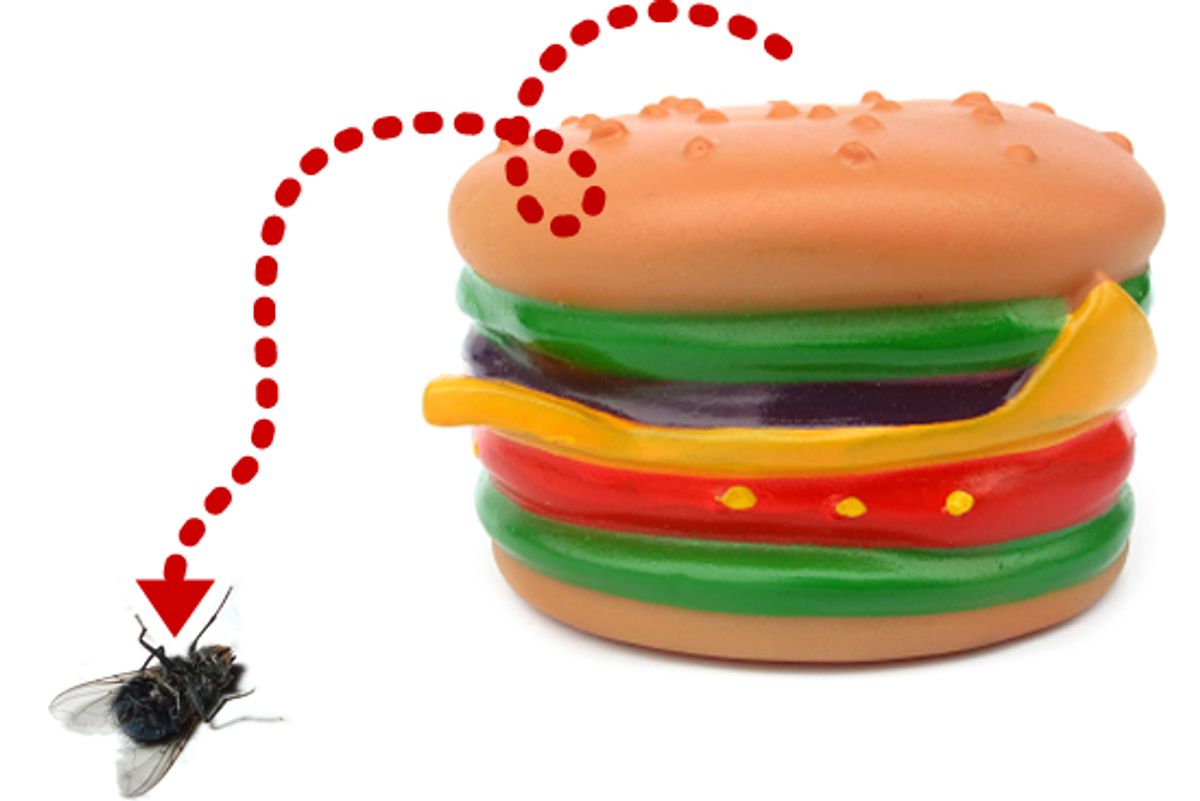Ever since Morgan Spurlock held up that jar of mysteriously well-preserved fries in "Super Size Me," the list of exhibits in the McDonald’s museum of food-that-refuses-go-bad has grown exponentially. The latest entrant is the Happy Meal Project, a burger and a packet of fries that have soldiered on undecayed for 143 days.
Started by New York photographer Sally Davies, as a part-art, part-food science experiment, the Happy Meal Project involves Davies documenting a Happy Meal every few days until it spoils. At day 137, the meal still looks pretty great.
And then there are other, more shocking examples of McDonald’s food's weird indestructibility: like this poor burger that’s been around for 12 years. This one managed to stave off mold for a year and this one’s been around the country in this lady’s purse for more than four years. Each experiment, of course, brings with it a new wave of fear and outrage over the chemicals and preservatives that are making our fast food almost inorganic.
For its part, McDonald’s has remained largely silent. The fast food giant’s Chinese arm released a statement this May to counter the hysteria over Joann Bruso’s year-long experiment. It announced that all its patties are made of 100 percent USDA-approved beef and are completely preservative-free. Sneakily, though, it made no mention of its fries, bread, cheese or sauce.
But preservatives alone may not be responsible for the fungus-resisting powers of a Happy Meal. Marion Nestle, chairwoman of New York University’s food studies program, told us over e-mail that McDonald’s would have to use "really a lot of" sodium propionate to prevent bacterial or mold growth.
McDonald's French fries, for example, which have repeatedly proven their hardiness to spoilage, contain citric acid as a preservative. But a bigger factor might be the fat content of the fries. About 50 percent of the total 250 calories contained in a small order of fries come from fat. "Anything that is high in fat will be low in moisture," says Barry Swanson, a professor at the Washington State University department of food science. And low moisture means less room for mold to grow. They're crisper and thinner than regular fries, which means that they’re exposed to greater heat per surface area, killing pathogens and reducing water content. McDonald's fries are also coated in a nice, thick layer of salt, something we've been using as a natural preservative for the last 2,500 years.
The beef patty is also high in fat -- varying between 37 and 54 percent of the total caloric content -- and has been cooked at a high temperature. "It’s also very thin, which once again means high heat per surface area," says Sean O’Keefe, a professor of food science at Virginia Tech. Davies noted that over time, her patty just shrank and hardened, losing whatever moisture it once contained.
A regular McDonald’s sesame-seed bun contains calcium propionate and sodium propionate -- both preservatives. But the list of ingredients -- down to the preservatives -- is actually no different from what you’d find on the packaging of your average loaf of supermarket white bread. Wonder Light Enriched Buns, for example, are also loaded with calcium propionate. While neither list mentions quantities, it’s reasonable to assume that both are under the FDA-approved limit.
Ultimately, says O’Keefe, the McDonald’s haters have gotten their science wrong. "The ingredients are similar to anything you’d see in processed fast food," he says. For better or for worse, McDonald’s is no more a chemical laboratory of secret compounds designed to embalm us from the inside than any other processed food maker. A Happy Meal manages to stay unspoiled because it is fatty, salty and practically empty of nutrients -- which, really, are all good reasons to avoid it anyway.



Shares